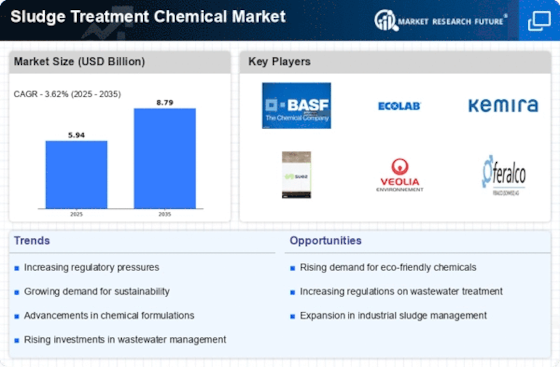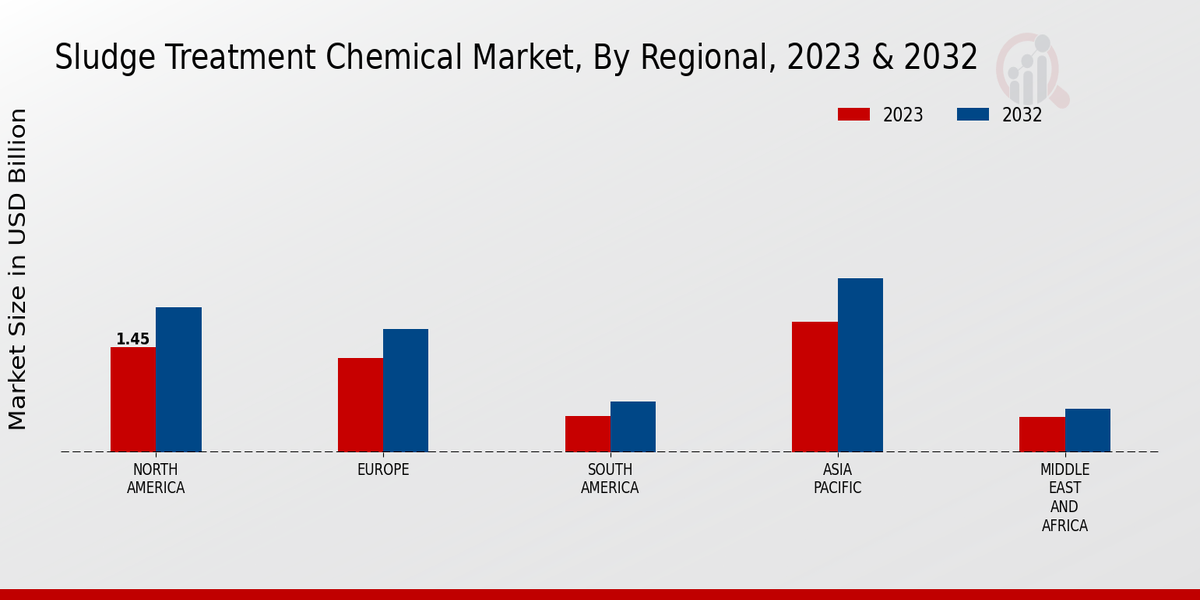Regulatory Compliance
Stringent environmental regulations worldwide compel industries to adopt effective sludge treatment chemicals. Governments are enforcing laws to minimize environmental impact, which drives the Global Sludge Treatment Chemical Market Industry. Compliance with these regulations often requires the use of specific chemicals that enhance the treatment process and ensure safe disposal of sludge. As industries strive to meet these standards, the demand for innovative sludge treatment solutions increases. This regulatory pressure is likely to contribute to the market's growth trajectory, with a notable increase in investments in treatment technologies and chemicals.
Increasing Urbanization
The rapid pace of urbanization globally drives the demand for effective sludge treatment solutions. As cities expand, the volume of wastewater generated rises, necessitating advanced sludge treatment chemical applications. In 2024, the Global Sludge Treatment Chemical Market Industry is valued at approximately 5.94 USD Billion, reflecting the urgent need for efficient waste management systems. Urban areas are increasingly investing in infrastructure to manage this waste, leading to a projected market growth. The trend indicates that by 2035, the market could reach 8.79 USD Billion, suggesting a compound annual growth rate (CAGR) of 3.62% from 2025 to 2035.
Technological Advancements
Innovations in sludge treatment technologies significantly influence the Global Sludge Treatment Chemical Market Industry. The development of advanced chemical formulations and treatment processes enhances efficiency and effectiveness in sludge management. Technologies such as anaerobic digestion and advanced oxidation processes are gaining traction, leading to improved recovery of resources from sludge. These advancements not only optimize treatment but also reduce operational costs for wastewater treatment facilities. As the industry embraces these technologies, the market is expected to expand, reflecting a growing awareness of sustainable practices and resource recovery.
Market Trends and Projections
Industrial Growth and Expansion
The expansion of various industries, including food and beverage, pharmaceuticals, and manufacturing, contributes to the demand for sludge treatment chemicals. As these sectors grow, the volume of wastewater generated increases, necessitating effective sludge management solutions. The Global Sludge Treatment Chemical Market Industry is poised to benefit from this industrial growth, as companies seek to enhance their wastewater treatment processes. The increasing focus on operational efficiency and compliance with environmental regulations further drives the adoption of advanced sludge treatment chemicals. This trend suggests a robust market outlook as industries continue to expand their operations.
Rising Awareness of Environmental Sustainability
Growing awareness regarding environmental sustainability is a key driver for the Global Sludge Treatment Chemical Market Industry. Stakeholders, including industries and municipalities, are increasingly recognizing the importance of sustainable waste management practices. This shift in mindset encourages the adoption of eco-friendly sludge treatment chemicals that minimize environmental impact. As consumers demand greener solutions, companies are compelled to innovate and invest in sustainable technologies. This trend is likely to bolster market growth, as organizations prioritize sustainability in their operational strategies, aligning with global efforts to combat climate change.













